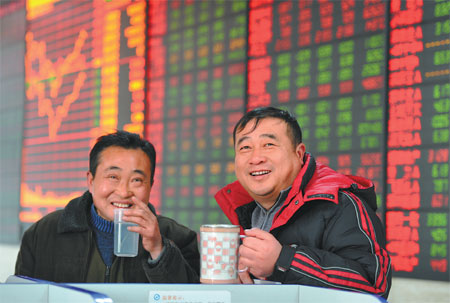Bourses mixed on first trading day of year yet outlook bright
Updated: 2013-01-05 09:54
By Wang Ying in Shanghai (China Daily)
|
||||||||
|
 |
|
An investor at a brokerage firm in Hangzhou, capital of Zhejiang province, on Friday. [Photo/China Daily] |
China's two bourses turned in a mixed performance on Friday, the first trading day of 2013.
The Shanghai Composite Index ended up 0.35 percent at 2,276.99 points, while the Shenzhen Component Index edged down 0.22 percent, closing at 9,096.07.
The market outlook is bright for the new year, according to Fei Xiaoping, an analyst from Dongguan Securities Co Ltd. But Huang Xuejun, an analyst from Guosen Securities, said the A-share market had gained about 15 percent in December, and some investors will choose to sell, which will drag the market down to some extent.
Huang added: "This is actually beneficial to the stock market, which has already entered an upward track, because a mild fall will make the rebound more sustainable."
Most analysts polled by China Daily said they are optimistic about the stock market for 2013, although China's two bourses are being outperformed by many benchmark indexes in the world's major economies.
In 2012, the Shanghai index gained 3.17 percent, while the Shenzhen index rose 2.22 percent. In contrast, the Standard & Poor's 500 Index in the US gained 11.5 percent and the Nasdaq Composite Index rose by 13.6 percent. Benchmark indexes in Japan, Germany and France posted annual gains of 14.5 percent to 29 percent.
Xiao Bo, an analyst from Huarong Securities Co Ltd, said economic conditions in China are improving.
China's purchasing managers' index, a gauge of the country's manufacturing activity, stood at 50.6 in December. The index has gained 1.4 points since last August, Xiao said.
It is the third consecutive month the PMI reading has registered more than 50, the point separating expansion from contraction in manufacturing activities.
Xiao said the suspension of initial public offerings on the Chinese mainland's bourses since November will push more investors to buy existing shares due to reduced supply of new shares.
Fei said the new leaders elected during the 18th National Congress of the Communist Party of China have so far sent many positive signals to drive domestic consumption and urbanization, and this will support industries involved in infrastructure construction, railways, water conservation projects, and property.
"In addition, relatively low valuations of finance and real estate-related stocks may further trigger a market rebound," Fei said.
Wang Jianhui, analyst from Southwest Securities Co Ltd, was more confident than others and said he believes market growth will extend through the Lunar New Year.
"After nearly three years of decline and consolidation, it is the turning point for the Chinese stock market, based on encouraging economic data from the last four months," Wang said.
Financial problems in the US and European Union are becoming less prominent, and growth will first be seen in finance and property-related stocks, gradually spreading to more industries, according toWang.
On Friday, new delisting procedures took effect on the Shanghai Stock Exchange as part of its efforts to promote delisting reform and better protect investors.
Two types of stocks will be traded on the newly launched risk alert board. One is shares carrying "ST" (special treatment) or "*ST" tags, which suffer losses for two consecutive years or more. The other type is stocks that enter delisting procedures.
Currently, a total of 23 stocks are capped with "ST" tags and another 20 carry "*ST" tags, with no stocks categorized as to-be-delisted, a source from the exchange said.
wang_ying@chinadaily.com.cn

 Li Na on Time cover, makes influential 100 list
Li Na on Time cover, makes influential 100 list
 FBI releases photos of 2 Boston bombings suspects
FBI releases photos of 2 Boston bombings suspects
 World's wackiest hairstyles
World's wackiest hairstyles
 Sandstorms strike Northwest China
Sandstorms strike Northwest China
 Never-seen photos of Madonna on display
Never-seen photos of Madonna on display
 H7N9 outbreak linked to waterfowl migration
H7N9 outbreak linked to waterfowl migration
 Dozens feared dead in Texas plant blast
Dozens feared dead in Texas plant blast
 Venezuelan court rules out manual votes counting
Venezuelan court rules out manual votes counting
Most Viewed
Editor's Picks

|

|

|

|

|

|
Today's Top News
Boston bombing suspect reported cornered on boat
7.0-magnitude quake hits Sichuan
Cross-talk artist helps to spread the word
'Green' awareness levels drop in Beijing
Palace Museum spruces up
First couple on Time's list of most influential
H7N9 flu transmission studied
Trading channels 'need to broaden'
US Weekly

|

|







